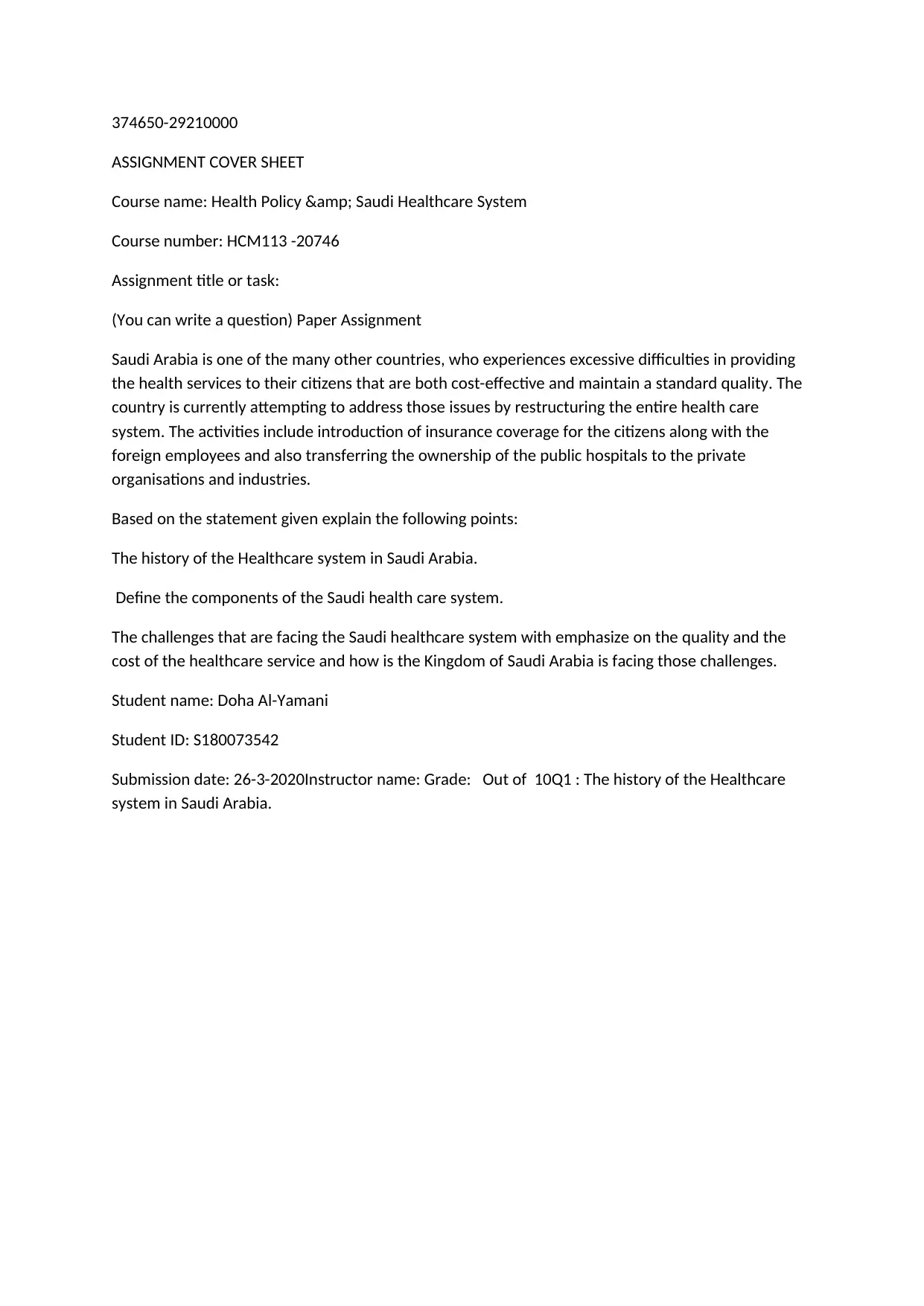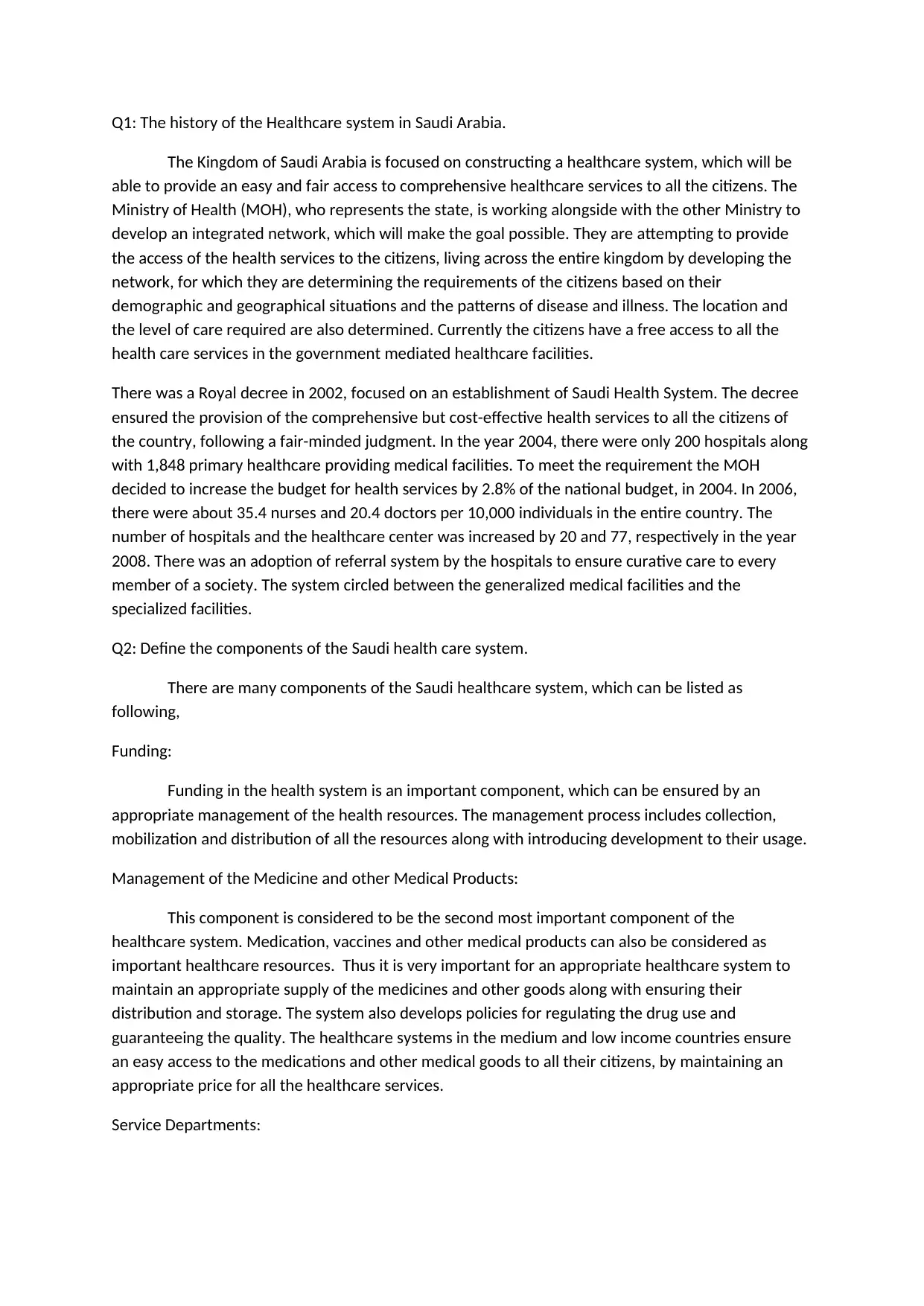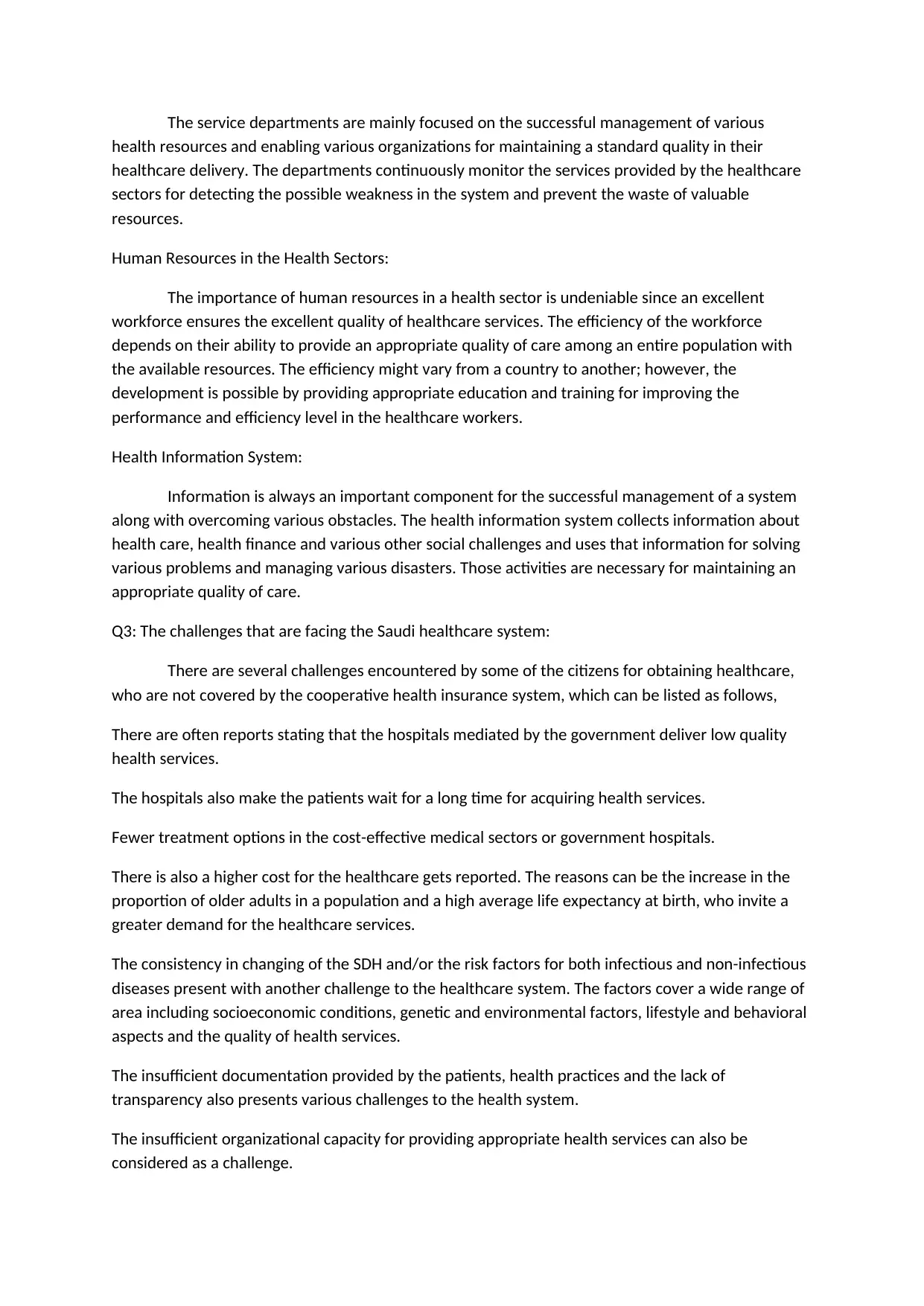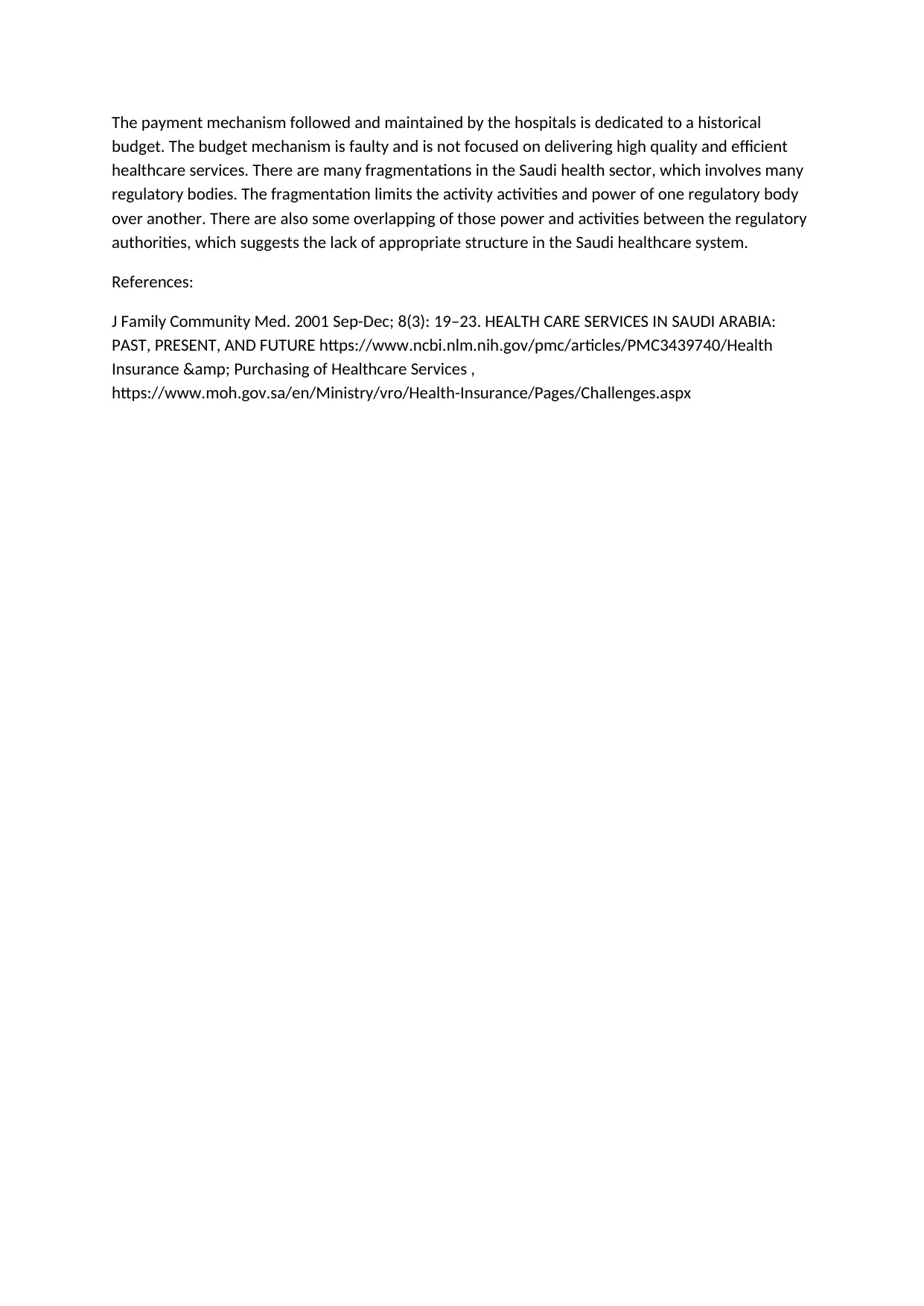Analysis of Saudi Healthcare System: HCM113 Report
VerifiedAdded on 2022/09/26
|4
|1307
|25
Report
AI Summary
This report provides a comprehensive analysis of the Saudi healthcare system, covering its historical development, key components, and the challenges it faces. The report begins with an overview of the healthcare system's evolution, highlighting key milestones such as the establishment of the Saudi Health System and the increasing investment in healthcare infrastructure. It then delves into the components of the system, including funding mechanisms, management of medicines and medical products, service departments, human resources, and the health information system. The core of the report focuses on the challenges that the Saudi healthcare system grapples with, such as issues related to quality of care, cost-effectiveness, and fragmentation. It also discusses the impact of an aging population and changing disease patterns. The report also mentions some of the solutions to the challenges, including the introduction of insurance coverage and transferring the ownership of the public hospitals to the private organisations and industries. The report concludes by highlighting the efforts of the Kingdom of Saudi Arabia in addressing these challenges and striving to provide comprehensive and accessible healthcare services to its citizens.

374650-29210000
ASSIGNMENT COVER SHEET
Course name: Health Policy & Saudi Healthcare System
Course number: HCM113 -20746
Assignment title or task:
(You can write a question) Paper Assignment
Saudi Arabia is one of the many other countries, who experiences excessive difficulties in providing
the health services to their citizens that are both cost-effective and maintain a standard quality. The
country is currently attempting to address those issues by restructuring the entire health care
system. The activities include introduction of insurance coverage for the citizens along with the
foreign employees and also transferring the ownership of the public hospitals to the private
organisations and industries.
Based on the statement given explain the following points:
The history of the Healthcare system in Saudi Arabia.
Define the components of the Saudi health care system.
The challenges that are facing the Saudi healthcare system with emphasize on the quality and the
cost of the healthcare service and how is the Kingdom of Saudi Arabia is facing those challenges.
Student name: Doha Al-Yamani
Student ID: S180073542
Submission date: 26-3-2020Instructor name: Grade: Out of 10Q1 : The history of the Healthcare
system in Saudi Arabia.
ASSIGNMENT COVER SHEET
Course name: Health Policy & Saudi Healthcare System
Course number: HCM113 -20746
Assignment title or task:
(You can write a question) Paper Assignment
Saudi Arabia is one of the many other countries, who experiences excessive difficulties in providing
the health services to their citizens that are both cost-effective and maintain a standard quality. The
country is currently attempting to address those issues by restructuring the entire health care
system. The activities include introduction of insurance coverage for the citizens along with the
foreign employees and also transferring the ownership of the public hospitals to the private
organisations and industries.
Based on the statement given explain the following points:
The history of the Healthcare system in Saudi Arabia.
Define the components of the Saudi health care system.
The challenges that are facing the Saudi healthcare system with emphasize on the quality and the
cost of the healthcare service and how is the Kingdom of Saudi Arabia is facing those challenges.
Student name: Doha Al-Yamani
Student ID: S180073542
Submission date: 26-3-2020Instructor name: Grade: Out of 10Q1 : The history of the Healthcare
system in Saudi Arabia.
Paraphrase This Document
Need a fresh take? Get an instant paraphrase of this document with our AI Paraphraser

Q1: The history of the Healthcare system in Saudi Arabia.
The Kingdom of Saudi Arabia is focused on constructing a healthcare system, which will be
able to provide an easy and fair access to comprehensive healthcare services to all the citizens. The
Ministry of Health (MOH), who represents the state, is working alongside with the other Ministry to
develop an integrated network, which will make the goal possible. They are attempting to provide
the access of the health services to the citizens, living across the entire kingdom by developing the
network, for which they are determining the requirements of the citizens based on their
demographic and geographical situations and the patterns of disease and illness. The location and
the level of care required are also determined. Currently the citizens have a free access to all the
health care services in the government mediated healthcare facilities.
There was a Royal decree in 2002, focused on an establishment of Saudi Health System. The decree
ensured the provision of the comprehensive but cost-effective health services to all the citizens of
the country, following a fair-minded judgment. In the year 2004, there were only 200 hospitals along
with 1,848 primary healthcare providing medical facilities. To meet the requirement the MOH
decided to increase the budget for health services by 2.8% of the national budget, in 2004. In 2006,
there were about 35.4 nurses and 20.4 doctors per 10,000 individuals in the entire country. The
number of hospitals and the healthcare center was increased by 20 and 77, respectively in the year
2008. There was an adoption of referral system by the hospitals to ensure curative care to every
member of a society. The system circled between the generalized medical facilities and the
specialized facilities.
Q2: Define the components of the Saudi health care system.
There are many components of the Saudi healthcare system, which can be listed as
following,
Funding:
Funding in the health system is an important component, which can be ensured by an
appropriate management of the health resources. The management process includes collection,
mobilization and distribution of all the resources along with introducing development to their usage.
Management of the Medicine and other Medical Products:
This component is considered to be the second most important component of the
healthcare system. Medication, vaccines and other medical products can also be considered as
important healthcare resources. Thus it is very important for an appropriate healthcare system to
maintain an appropriate supply of the medicines and other goods along with ensuring their
distribution and storage. The system also develops policies for regulating the drug use and
guaranteeing the quality. The healthcare systems in the medium and low income countries ensure
an easy access to the medications and other medical goods to all their citizens, by maintaining an
appropriate price for all the healthcare services.
Service Departments:
The Kingdom of Saudi Arabia is focused on constructing a healthcare system, which will be
able to provide an easy and fair access to comprehensive healthcare services to all the citizens. The
Ministry of Health (MOH), who represents the state, is working alongside with the other Ministry to
develop an integrated network, which will make the goal possible. They are attempting to provide
the access of the health services to the citizens, living across the entire kingdom by developing the
network, for which they are determining the requirements of the citizens based on their
demographic and geographical situations and the patterns of disease and illness. The location and
the level of care required are also determined. Currently the citizens have a free access to all the
health care services in the government mediated healthcare facilities.
There was a Royal decree in 2002, focused on an establishment of Saudi Health System. The decree
ensured the provision of the comprehensive but cost-effective health services to all the citizens of
the country, following a fair-minded judgment. In the year 2004, there were only 200 hospitals along
with 1,848 primary healthcare providing medical facilities. To meet the requirement the MOH
decided to increase the budget for health services by 2.8% of the national budget, in 2004. In 2006,
there were about 35.4 nurses and 20.4 doctors per 10,000 individuals in the entire country. The
number of hospitals and the healthcare center was increased by 20 and 77, respectively in the year
2008. There was an adoption of referral system by the hospitals to ensure curative care to every
member of a society. The system circled between the generalized medical facilities and the
specialized facilities.
Q2: Define the components of the Saudi health care system.
There are many components of the Saudi healthcare system, which can be listed as
following,
Funding:
Funding in the health system is an important component, which can be ensured by an
appropriate management of the health resources. The management process includes collection,
mobilization and distribution of all the resources along with introducing development to their usage.
Management of the Medicine and other Medical Products:
This component is considered to be the second most important component of the
healthcare system. Medication, vaccines and other medical products can also be considered as
important healthcare resources. Thus it is very important for an appropriate healthcare system to
maintain an appropriate supply of the medicines and other goods along with ensuring their
distribution and storage. The system also develops policies for regulating the drug use and
guaranteeing the quality. The healthcare systems in the medium and low income countries ensure
an easy access to the medications and other medical goods to all their citizens, by maintaining an
appropriate price for all the healthcare services.
Service Departments:

The service departments are mainly focused on the successful management of various
health resources and enabling various organizations for maintaining a standard quality in their
healthcare delivery. The departments continuously monitor the services provided by the healthcare
sectors for detecting the possible weakness in the system and prevent the waste of valuable
resources.
Human Resources in the Health Sectors:
The importance of human resources in a health sector is undeniable since an excellent
workforce ensures the excellent quality of healthcare services. The efficiency of the workforce
depends on their ability to provide an appropriate quality of care among an entire population with
the available resources. The efficiency might vary from a country to another; however, the
development is possible by providing appropriate education and training for improving the
performance and efficiency level in the healthcare workers.
Health Information System:
Information is always an important component for the successful management of a system
along with overcoming various obstacles. The health information system collects information about
health care, health finance and various other social challenges and uses that information for solving
various problems and managing various disasters. Those activities are necessary for maintaining an
appropriate quality of care.
Q3: The challenges that are facing the Saudi healthcare system:
There are several challenges encountered by some of the citizens for obtaining healthcare,
who are not covered by the cooperative health insurance system, which can be listed as follows,
There are often reports stating that the hospitals mediated by the government deliver low quality
health services.
The hospitals also make the patients wait for a long time for acquiring health services.
Fewer treatment options in the cost-effective medical sectors or government hospitals.
There is also a higher cost for the healthcare gets reported. The reasons can be the increase in the
proportion of older adults in a population and a high average life expectancy at birth, who invite a
greater demand for the healthcare services.
The consistency in changing of the SDH and/or the risk factors for both infectious and non-infectious
diseases present with another challenge to the healthcare system. The factors cover a wide range of
area including socioeconomic conditions, genetic and environmental factors, lifestyle and behavioral
aspects and the quality of health services.
The insufficient documentation provided by the patients, health practices and the lack of
transparency also presents various challenges to the health system.
The insufficient organizational capacity for providing appropriate health services can also be
considered as a challenge.
health resources and enabling various organizations for maintaining a standard quality in their
healthcare delivery. The departments continuously monitor the services provided by the healthcare
sectors for detecting the possible weakness in the system and prevent the waste of valuable
resources.
Human Resources in the Health Sectors:
The importance of human resources in a health sector is undeniable since an excellent
workforce ensures the excellent quality of healthcare services. The efficiency of the workforce
depends on their ability to provide an appropriate quality of care among an entire population with
the available resources. The efficiency might vary from a country to another; however, the
development is possible by providing appropriate education and training for improving the
performance and efficiency level in the healthcare workers.
Health Information System:
Information is always an important component for the successful management of a system
along with overcoming various obstacles. The health information system collects information about
health care, health finance and various other social challenges and uses that information for solving
various problems and managing various disasters. Those activities are necessary for maintaining an
appropriate quality of care.
Q3: The challenges that are facing the Saudi healthcare system:
There are several challenges encountered by some of the citizens for obtaining healthcare,
who are not covered by the cooperative health insurance system, which can be listed as follows,
There are often reports stating that the hospitals mediated by the government deliver low quality
health services.
The hospitals also make the patients wait for a long time for acquiring health services.
Fewer treatment options in the cost-effective medical sectors or government hospitals.
There is also a higher cost for the healthcare gets reported. The reasons can be the increase in the
proportion of older adults in a population and a high average life expectancy at birth, who invite a
greater demand for the healthcare services.
The consistency in changing of the SDH and/or the risk factors for both infectious and non-infectious
diseases present with another challenge to the healthcare system. The factors cover a wide range of
area including socioeconomic conditions, genetic and environmental factors, lifestyle and behavioral
aspects and the quality of health services.
The insufficient documentation provided by the patients, health practices and the lack of
transparency also presents various challenges to the health system.
The insufficient organizational capacity for providing appropriate health services can also be
considered as a challenge.
⊘ This is a preview!⊘
Do you want full access?
Subscribe today to unlock all pages.

Trusted by 1+ million students worldwide

The payment mechanism followed and maintained by the hospitals is dedicated to a historical
budget. The budget mechanism is faulty and is not focused on delivering high quality and efficient
healthcare services. There are many fragmentations in the Saudi health sector, which involves many
regulatory bodies. The fragmentation limits the activity activities and power of one regulatory body
over another. There are also some overlapping of those power and activities between the regulatory
authorities, which suggests the lack of appropriate structure in the Saudi healthcare system.
References:
J Family Community Med. 2001 Sep-Dec; 8(3): 19–23. HEALTH CARE SERVICES IN SAUDI ARABIA:
PAST, PRESENT, AND FUTURE https://www.ncbi.nlm.nih.gov/pmc/articles/PMC3439740/Health
Insurance & Purchasing of Healthcare Services ,
https://www.moh.gov.sa/en/Ministry/vro/Health-Insurance/Pages/Challenges.aspx
budget. The budget mechanism is faulty and is not focused on delivering high quality and efficient
healthcare services. There are many fragmentations in the Saudi health sector, which involves many
regulatory bodies. The fragmentation limits the activity activities and power of one regulatory body
over another. There are also some overlapping of those power and activities between the regulatory
authorities, which suggests the lack of appropriate structure in the Saudi healthcare system.
References:
J Family Community Med. 2001 Sep-Dec; 8(3): 19–23. HEALTH CARE SERVICES IN SAUDI ARABIA:
PAST, PRESENT, AND FUTURE https://www.ncbi.nlm.nih.gov/pmc/articles/PMC3439740/Health
Insurance & Purchasing of Healthcare Services ,
https://www.moh.gov.sa/en/Ministry/vro/Health-Insurance/Pages/Challenges.aspx
1 out of 4
Related Documents
Your All-in-One AI-Powered Toolkit for Academic Success.
+13062052269
info@desklib.com
Available 24*7 on WhatsApp / Email
![[object Object]](/_next/static/media/star-bottom.7253800d.svg)
Unlock your academic potential
Copyright © 2020–2026 A2Z Services. All Rights Reserved. Developed and managed by ZUCOL.





